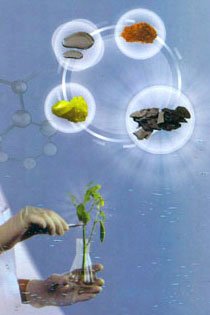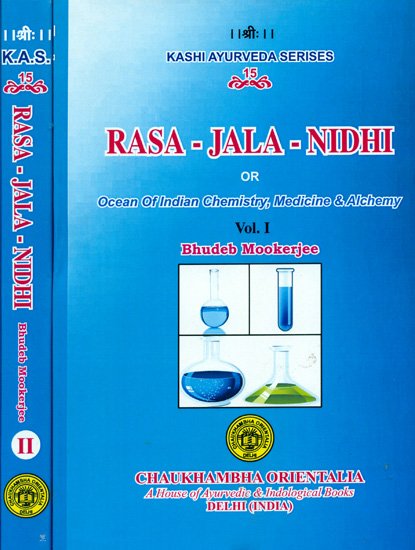Rasa Jala Nidhi, vol 2: Minerals (uparasa)
by Bhudeb Mookerjee | 1938 | 28,803 words | ISBN-10: 8170305829 | ISBN-13: 9788170305828
This second volume of the Rasa-jala-nidhi deals with the purification, incineration and medicinal uses of various minerals (uparasa), as well as preventing faults due to misuse. It is continued in the third volume which deals with the various metals. The Rasa-jala-nidhi (“the ocean of Iatrochemistry, or, chemical medicine) is a compendium of Sansk...
Theory of vayu (vata), pitta and kapha
Everyone of us is aware of the universal law of gravitation by which material bodies have a tendency to move towards the centre of the earth, which it is not feasible for theta to reach as they cannot pierce into the hard surface which presents a serious obstacle to their downward passage. All material substances are thus necessarily attracted towards the earth, being unable to rise up in the air from its surface. It is, however, seen that many of them are not immoveably fixed to the earth and can move about on its surface as men and animals do. Inanimate things which are light in weight can be moved hither and thither by the force of wind, while things that are heavy remain attached to the earth with comparative steadiness; even these can possibly be moved from one place to another in many cases, Why is this so? If all material bodies have an irresistible tendency to move towards the centre of the earth, how can it be possible for them to move about or be driven from one place to another. The answer is that it is the existence of wind and air which makes such movement possible, Air is perpetually in motion, and, permeating through every substance on the surface of the earth, imparts the power of movement to it. If there were no air, all things would have been immovably fixed to the surface of the earth without any power to move at all. There is hardly any place in this world which is devoid of air, which exists even in stone, iron, and other hard substances. All substances are composed of minute particles, called atoms, which adhere together in such a way as to admit of some vacant space, however small, between them, which varies in different substances and which is to be found even in iron, stone, human system, and in a mass of water as well. It is through these fine spaces that air enters into all things. In hard substances, this intervening space is very little, and the quantity of air that enters through it is hardly perceptible.
What has been said above makes it abundantly clear that air enters into all substances in the world and makes them moveable. The greater the quantity of air in a substance, the more capable it is of movement. Air enters into the human system and renders it fit for loco-motion. Not Only does it enter through the nostrils and the mouth, it also finds access into the human body through infinitely small openings between its molecules which are finer than the pores of the skin and are countless in number. It penetrates deep into the blood, flesh, and bones; and it is this which causes the blood to circulate through the veins and arteries in all parts of the body. Blood may flow down from the brain to the extremities or it may rush to the head from the feet in a contrary direction. The first phenomenon may be due to gravitation but the second can never take place without the agency of air. We all speak of circulation of blood but we do not perhaps know how this is caused. The primary and only cause of this circulation of blood is the constant presence of air which enters into every part of our body and sets the entire organism in motion. It is present everywhere and pervades the bones, the flesh, the blood, and even the minutest parts of our body. If you apply heat to any part of your body, blood takes its course in that direction, and on the other hand, if you apply cold to any part, the blood tends to flow away from that part. Vayu or air is the cause of this movement. If heat is applied to any part of the body, the air in that part becomes lighter and expands by the action of heat and some portion of the air shifts to other parts. The vacuum thus caused is filled by the flow of blood from other parts i.e., blood rushes in from other parts to take the place of the displaced air. There is thus a ceaseless movement going on within the body. An application of cold on the other hand produces an opposite effect. When any part of the body becomes cold the other parts of it become comparatively warm; hence a portion of the blood from the former rushes to the warmer parts.
From this it is clear that without air we could not live, nor could there be any circulation in the system. Vayu or air is therefore one of the main conditions of life, nay, it constitutes a primary ingredient of animal organism. The various organic functions, such as breathing, discharge of excreta, circulation, exercise will power, and energy are carried on through its instrumentality.
Air, though forming one of the chief constituents of the human body, acts prejudicially on it when it finds its way into the system in an abnormal quantity. When it exceeds the quantity required to stimulate circulation, the flesh, bones, marrow, etc. dry up and become contracted under its pressure. The greater the quantity of air generated in the system, the more heavily will it press upon blood, bones, etc. Allopaths now-a-days speak of blood-pressure which is probably nothing but the pressure of air upon blood. It cannot strictly be called blood-pressure, for it does not press upon blood alone, but on flesh, bones, marrow and other parts of the body as well.
Pitta or Pittam (animal heat).
The solar system is the fountain and source of all heat, and all things in this world derive heat from the sun, This warmth which is present every-where in a more or less degree, cannot be felt by the touch in all cases. If the heat of any substance exceeds the normal temperature of our body, we say that it is heated; if it be less, we say that it is cold. The constituents of animal organism i.e., blood, flesh etc., possess a natural warmth which is termed pitta without which life would have been unsupportable. Like air, it forms one of the vital constituents of our body.
But an abnormal increase of animal heat vitiates our blood and brings on that state or condition of our body which is usually termed bilious complication or derangement due to excess of animal heat. This disorder gives rise to endless diseases. On the other hand, an unnatural decrease of bodily warmth is no less attended with danger. As excess or preponderance of pitta gives rise to diseases, abnormal increase or decrease of the same may even bring about death. Health and long life may be ensured by maintaining the internal heat of the body in a normal condition.
Kapha (Phlegm).
It has been said that the function of air in the body is to produce dryness or, in other words, to absorb moisture from it while that of pitta is to generate heat or warmth in it. The things which constitute our body are rendered dry by air and warm by pitta, but dryness and warmth are not the only attributes of human organism which is also characterised by the quality of coldness or tenderness without which life would have been impossible. Besides dryness and heat, all the constituents of human body possess softness which is present in the blood, bones, flesh, and other vital parts. The general name for this all pervading softness is phlegm, which is present in different parts of the body in various forms, and performs diverse functions. If there is excess of the phlegm over what is necessary for the sustenance of life, various diseases may develop; on the other hand, if it unduly decreases, it may be attended with serious and baneful consequences. Total loss of phlegm as well as an abnormal excess of the same may even lead to death. The same remarks may be made with regard to Vayu or air and Pitta or animal beat. Abnormal preponderance of these three vital elements is as dangerous and baneful as their abnormal decrease or loss.
Effects of Vayu, Pitta, and Phlegm.
The following symptoms usually develop when wind (vayu) is unduly in excess in our body:—Pain in the limbs, prostration, scanty evacuation of urine and stools, contraction of the arteries, nerves, etc. thirst, shivering, roughness of the skin, astringent taste, dryness of the mouth, and high-coloured urine, etc.
When the animal heat is unduly in excess, the following symptoms appear burning sensation in the palm of the hands and feet, redness of the skin, generation of excessive heat in the system, promotion of digestion, sweating, etc.
Conclusion:
 This concludes ‘Theory of vayu (vata), pitta and kapha’ included in Bhudeb Mookerjee Rasa Jala Nidhi, vol 2: Initiation, Mercury and Laboratory. The text includes treatments, recipes and remedies and is categorised as Rasa Shastra: an important branch of Ayurveda that specialises in medicinal/ herbal chemistry, alchemy and mineralogy, for the purpose of prolonging and preserving life.
This concludes ‘Theory of vayu (vata), pitta and kapha’ included in Bhudeb Mookerjee Rasa Jala Nidhi, vol 2: Initiation, Mercury and Laboratory. The text includes treatments, recipes and remedies and is categorised as Rasa Shastra: an important branch of Ayurveda that specialises in medicinal/ herbal chemistry, alchemy and mineralogy, for the purpose of prolonging and preserving life.
